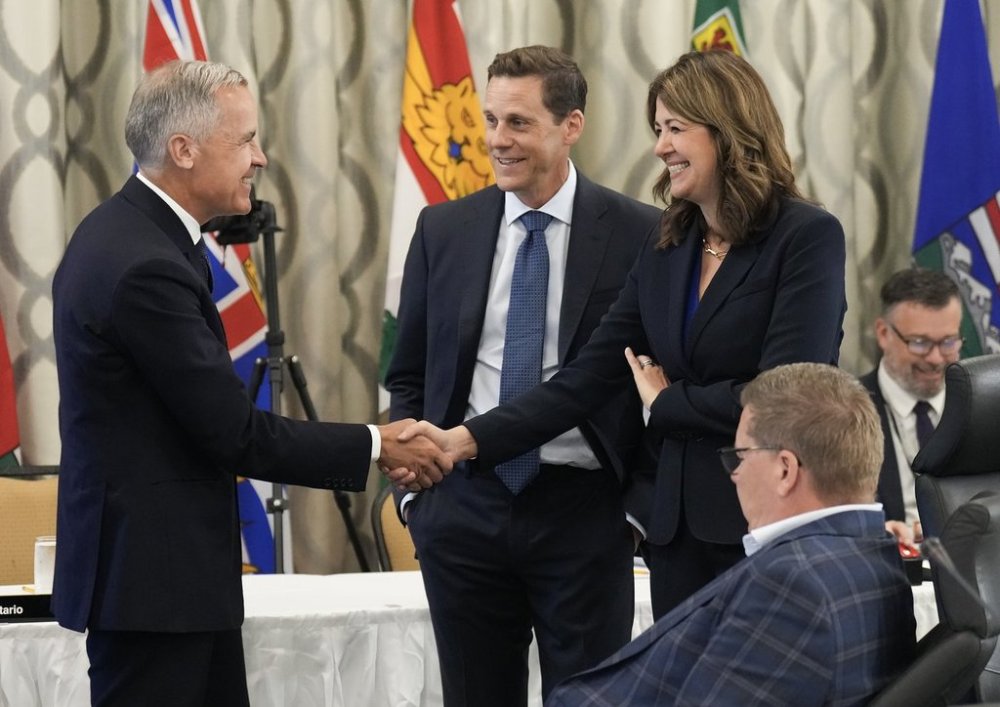Business
Carney to Announce Alberta Pipeline Deal Amid Climate Policy Shift

Prime Minister Mark Carney is set to introduce a pivotal agreement with the province of Alberta that may facilitate the development of a new oil pipeline. Scheduled for announcement on November 27, 2025, the deal is expected to involve commitments to enhanced environmental regulations, while potentially reversing some of the federal government’s existing climate policies.
Alberta Premier Danielle Smith has previously described the negotiations with Ottawa as a “grand bargain.” This agreement could enable the Pathways Alliance, a significant carbon-capture initiative, to advance alongside the proposed pipeline to the West Coast. Speaking to reporters in Ottawa, Carney emphasized that the memorandum of understanding (MOU) encompasses a broader vision. “It’s about building this economy, it’s about making Canada more independent, and it’s about making Canada more sustainable,” he stated, hinting at multiple components to be revealed in the announcement.
The proposed pipeline faces challenges, particularly due to the existing tanker ban which prohibits vessels carrying more than 12,500 metric tonnes of crude oil from operating in specific areas along the northern coast of British Columbia. This legislation, enacted in 2019 under former Prime Minister Justin Trudeau, has been a focal point for Alberta’s government. David Eby, Premier of British Columbia, has urged the federal government to maintain this ban, signalling the complexities involved in the negotiations.
The leader of the Coastal First Nations in British Columbia has expressed strong opposition to the pipeline, stating unequivocally that it “will never happen.” In response to inquiries about whether he had communicated to Alberta that Ottawa would consider lifting the tanker ban, Carney deferred, indicating he would provide answers during the announcement.
In addition to the pipeline discussions, the MOU is likely to cover amendments to Alberta’s industrial carbon pricing system. Smith has indicated a willingness to reassess the province’s freeze on the industrial carbon price, currently set at $95 per tonne and maintained until 2026. This figure diverges from the federal government’s planned increase, which will see the backstop price rise to $110 per tonne next year.
Carney’s administration has refrained from clarifying whether Ottawa will impose the federal backstop on Alberta and Saskatchewan, the latter of which eliminated its industrial carbon price entirely in April. The recent federal climate competitiveness strategy outlines objectives for strengthening this pricing system, projecting future price increases beyond 2030.
Carbon pricing operates by capping the maximum allowable emissions for industries. Companies that remain under this cap can sell credits to those that exceed it, incentivizing investment in emissions reductions. However, if credit prices remain low, companies may prefer to buy credits rather than invest in sustainable practices.
The government’s climate strategy also suggests a potential end to Ottawa’s emissions cap on oil and gas producers, a move advocated by Smith and industry stakeholders. The removal of this cap, however, hinges on the implementation of promised enhancements to the industrial pricing framework, scaling up carbon capture and storage technologies, and stricter regulations aimed at reducing methane emissions in the oil and gas sector.
As the announcement approaches, the implications of this agreement could significantly reshape Canada’s energy landscape and its approach to climate policy. The outcome will likely influence both economic and environmental strategies across the country.
-

 Politics3 weeks ago
Politics3 weeks agoSecwepemc First Nation Seeks Aboriginal Title Over Kamloops Area
-

 World4 months ago
World4 months agoScientists Unearth Ancient Antarctic Ice to Unlock Climate Secrets
-

 Entertainment5 months ago
Entertainment5 months agoTrump and McCormick to Announce $70 Billion Energy Investments
-

 Lifestyle4 months ago
Lifestyle4 months agoTransLink Launches Food Truck Program to Boost Revenue in Vancouver
-

 Science5 months ago
Science5 months agoFour Astronauts Return to Earth After International Space Station Mission
-

 Technology3 months ago
Technology3 months agoApple Notes Enhances Functionality with Markdown Support in macOS 26
-

 Top Stories2 months ago
Top Stories2 months agoUrgent Update: Fatal Crash on Highway 99 Claims Life of Pitt Meadows Man
-

 Lifestyle3 months ago
Lifestyle3 months agoManitoba’s Burger Champion Shines Again Amid Dining Innovations
-

 Politics4 months ago
Politics4 months agoUkrainian Tennis Star Elina Svitolina Faces Death Threats Online
-

 Sports5 months ago
Sports5 months agoSearch Underway for Missing Hunter Amid Hokkaido Bear Emergency
-

 Politics4 months ago
Politics4 months agoCarney Engages First Nations Leaders at Development Law Summit
-

 Technology5 months ago
Technology5 months agoFrosthaven Launches Early Access on July 31, 2025





















